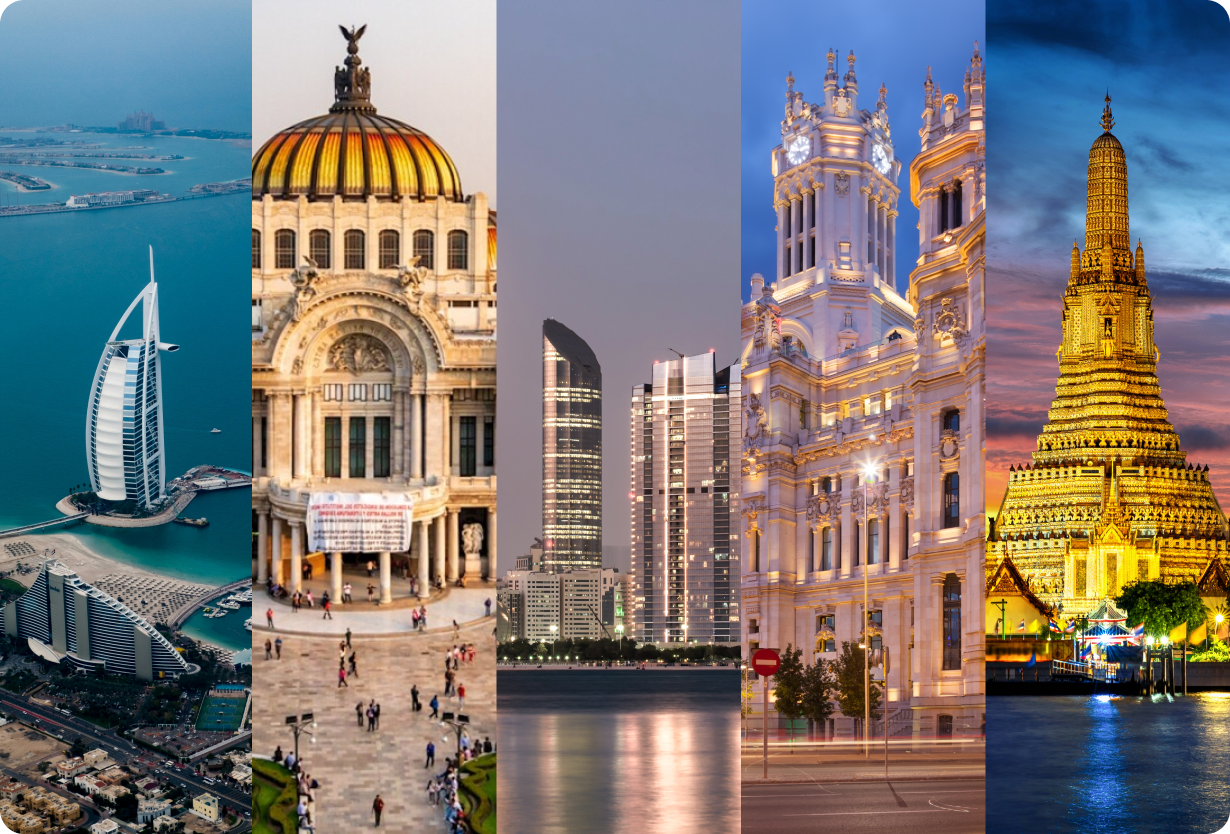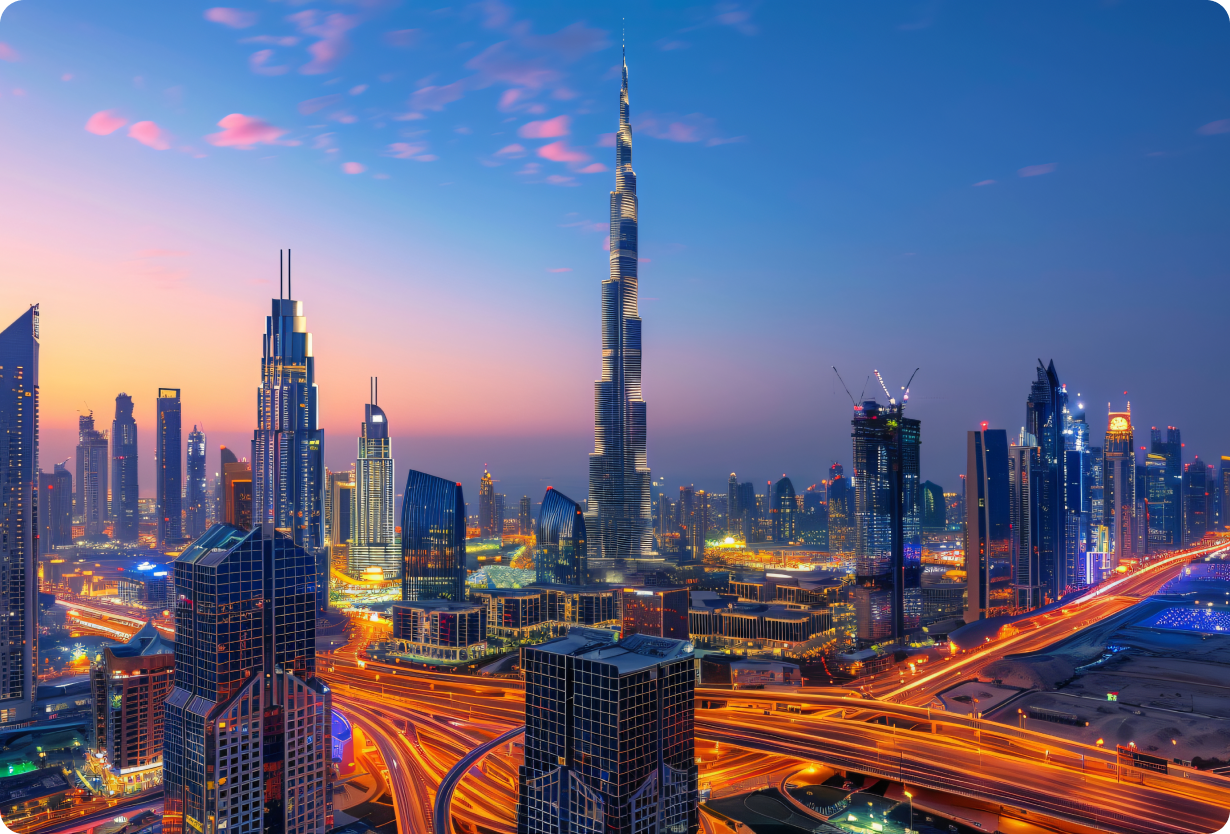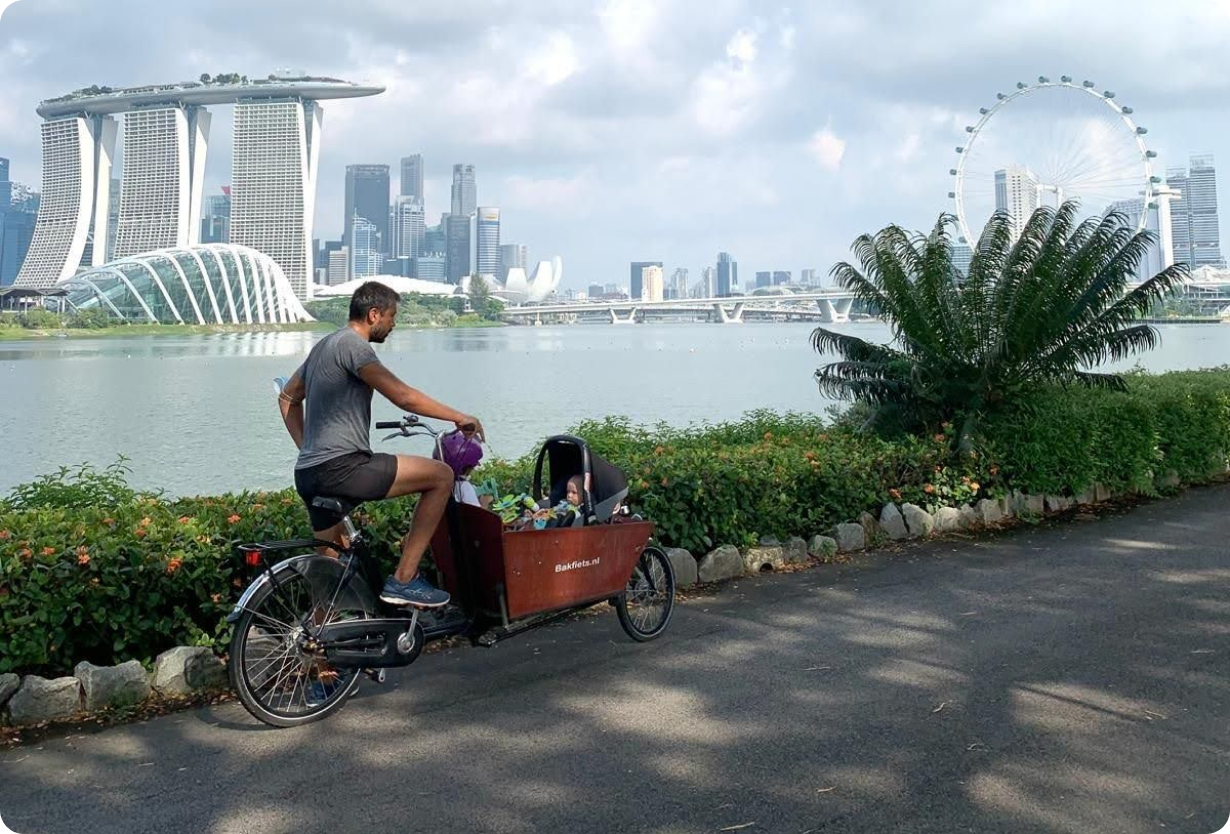
Table of Contents
- Quick Overview: Dubai at a Glance
- The Tax Reality in 2025
- Visa Pathways for Global Citizens
- The Business Environment: Speed as Currency
- Practical Living: Neighborhoods, Banking, and Logistics
- Quality of Life: The Complete Picture
- Strategic Living: Who Thrives in Dubai
- Beyond Dubai: The Hub Strategy
- Final Thoughts: Is Dubai Right for You?
As I landed back in Lisbon after my recent trip to Dubai, the contrast couldn’t have been more striking. Two cities. Two entirely different philosophies.
I currently live in Lisbon. But having lived in Dubai for four years and now splitting my time between multiple global hubs, I’ve experienced firsthand how these contrasting environments shape not just business outcomes, but entire mindsets. In just the first few days back in Dubai I closed deals that would have taken months in Europe, saw people who only a few years ago were starting from scratch but were now running multi-million dollar brands. The raw energy of a place where everyone is building something was palpable.
For global citizens contemplating strategic relocation in 2025, Dubai remains a compelling option – but one that comes with nuanced considerations beyond the headline tax benefits. This guide combines practical information with my personal observations to help you determine if Dubai might be the right fit for your global mobility strategy.

Thinking of relocating?
A free call with our relocation expert will give you a clear path forward – no stress, just answers.
Quick Overview: Dubai at a Glance
| Feature | Details |
|---|---|
| Personal Income Tax | 0% |
| Corporate Tax | 9% on profits above AED 375,000 ($102,000) |
| Safety Ranking | 4th safest city globally (2024) |
| Climate | 8 months pleasant, 4 months extremely hot |
| Visa Options | Multiple pathways including digital nomad, freelance, Golden Visa |
| Business Setup | Free Zone companies, mainland options |
| Connectivity | 7hrs to London/Singapore, 14hrs to NYC |
| Cost of Living | 15-20% higher than European capitals (excluding tax benefits) |
| Banking | Strong infrastructure for individuals, more complex for crypto |
The Tax Reality in 2025
Dubai’s reputation as a tax haven has evolved significantly since I first moved there. Let’s be clear about what remains true in 2025 and what has changed:
For Individuals: The 0% Dream Lives On
For individuals, Dubai maintains its position as one of the world’s most advantageous tax jurisdictions:
- 0% personal income tax
- 0% tax on interest & dividends
- 0% capital gains tax
- 0% inheritance tax
- 0% wealth tax
These benefits remain unmatched by most developed economies and create substantial advantages for high-income professionals, particularly those able to work remotely or structure their business appropriately.
For Businesses: A New Reality
The landscape for businesses has fundamentally shifted since June 2023:
- 9% corporate tax on profits above AED 375,000 ($102,000)
- 5% VAT implemented since 2018
- Excise taxes on specific products
This evolution aligns Dubai more closely with global tax norms, though it remains highly competitive compared to Western jurisdictions like the UK (25%), US (21% federal plus state), or Germany (~30%).
The timeline of tax changes tells a story:
- 2017: Excise taxes introduced
- 2018: 5% VAT implemented
- 2023: 9% corporate tax introduced
- 2025: Domestic Minimum Top-up Tax for multinationals
This progressive implementation shows Dubai gradually aligning with global tax standards while maintaining its competitive edge.
Strategic Tax Planning in 2025
Conversations with tax experts in Dubai reveal several viable strategies:
1. Free Zone Optimization
Qualifying Free Zone Persons (QFZPs) can still benefit from 0% tax on qualifying income. The most strategic free zones in 2025 include:
| DMCC | Commodities, Trading | $8,000-15,000 | 1-2 weeks | Strong global reputation |
| DIFC | Financial Services | $12,000-30,000 | 2-3 weeks | Independent legal system |
| Dubai Internet City | Technology | $10,000-20,000 | 2-3 weeks | Tech ecosystem access |
| Dubai Design District | Creative Industries | $8,000-18,000 | 2-3 weeks | Creative community |
| DAFZA | Import/Export | $12,000-25,000 | 3-4 weeks | Airport proximity |
However, non-qualifying income is taxed at 9%, and the qualification rules require careful navigation with professional guidance.
2. Small Business Threshold
If your business generates less than AED 375,000 in annual profit, you still benefit from 0% corporate tax – creating an excellent opportunity for freelancers, digital nomads, and small business owners.
3. The Freelancer Advantage
With proper structuring, freelancers can optimize between personal income (0% tax) and business income (potentially 0% if below threshold). The freelance visa pathway through zones like GoFreelance has become increasingly popular for this reason.Expert Insight: Speaking with Dubai-based tax advisors in early 2025, a recurring theme emerges: we’re still in the early implementation phase of the corporate tax. The first real applications of the 9% rules and relevant enforcement practices will only become fully clear in late 2025 and early 2026. This uncertainty requires flexible planning rather than rigid structures.
Visa Pathways for Global Citizens
Dubai has strategically expanded its visa options to attract different types of global citizens. Based on my experience helping others relocate, here are the most relevant pathways in 2025:
Remote Work Visa
Launched in 2020 and continuously refined, this one-year visa allows professionals to live in Dubai while working for employers abroad. Requirements include:
- Proof of employment with minimum monthly salary of $5,000
- Valid health insurance
- Processing time: 2-3 weeks typical
- Cost: Approximately $600 plus insurance
The visa is renewable, providing a straightforward path for digital professionals to experience Dubai’s benefits without changing employers.
Freelance Visa
Particularly valuable for independent professionals, this option allows you to legally work as a freelancer based in Dubai:
- Available through free zones like GoFreelance
- Requires professional credentials and portfolio
- Annual costs from $3,500-$7,000 depending on zone and services
- Provides residency and ability to sponsor family members
This pathway is especially powerful as it allows direct billing from Dubai while maintaining the 0% personal income tax advantage.
Employment Visa via Own Company Setup
A popular and often overlooked option, this visa is ideal for entrepreneurs and solo founders:
- Involves setting up a free zone or mainland company in Dubai
- You become the company’s director or employee, sponsoring yourself for residency
- Costs typically start from $4,000-$6,000 annually for licensing, establishment card, and visa issuance
- Provides full residency benefits, including the ability to sponsor family members
- Often chosen by consultants, small business owners, and those who prefer complete control over their residency pathway
This approach combines the benefits of an employment visa with the freedom of self-employment and direct access to Dubai’s business ecosystem.
UAE Golden Visa
For investors and exceptional talents, the 10-year Golden Visa provides longer-term stability:
- Real estate investment: Minimum AED 2 million ($544,000) in property
- Company startup: With significant capital (various thresholds)
- Investment in approved funds: Minimum AED 2 million
- Exceptional talents: In science, art, technology, and other fields
- Entrepreneurs: With approved business plans and funding
The substantial benefit of the Golden Visa is its 10-year validity, which significantly reduces administrative overhead and provides certainty for long-term planning.
Green Visa
Introduced more recently, the Green Visa targets skilled professionals, freelancers, and self-employed individuals:
- 5-year validity
- Self-sponsorship (no employer required)
- Ability to sponsor family members
- Grace period of up to 6 months upon visa cancellation
- Minimum salary requirement of AED 15,000 ($4,083) monthly
The Green Visa represents Dubai’s adaptation to the changing nature of work, creating a flexible option for the growing independent professional class.
Retirement Visa
For those over 55 years old, the retirement visa offers a renewable 5-year residency:
- Financial requirements: Either AED 1 million ($272,000) in savings, property worth AED 1 million, or monthly income of AED 15,000 ($4,083)
- Health insurance coverage
- Simple renewal process
This option has attracted a growing community of early retirees looking to combine tax efficiency with quality of life.
Family Sponsorship Options
All visa types allow sponsoring immediate family members:
- Spouse
- Children under 18
- Unmarried daughters of any age
- Sons under 25 in education
- Parents (with additional requirements)
Personal Experience: When I first moved to Dubai, I learned that the headline requirements are just the beginning – the practical implementation often involves nuances not captured in official documentation. This is where local expertise becomes invaluable.
Practical Tip: From helping numerous clients relocate, I’ve observed that the processing efficiency varies significantly by free zone. DIFC maintains among the most efficient processing for professional services, while DMCC often provides better value for trading activities. These practical differences rarely appear in official documentation but can significantly impact your experience.
The Business Environment: Speed as Currency
Perhaps Dubai’s most distinctive characteristic – and one that becomes embedded in your thought patterns after living there – is its exceptional pace.
The Velocity Advantage
The Dubai business environment operates at a fundamentally different speed than most global cities. This creates both opportunities and pressures:
- Deal velocity: Transactions that might take months elsewhere often close in days or weeks
- Decision-making: Approvals and commitments happen rapidly, with less bureaucratic cycling
- Implementation: From licenses to operations, the timeline from concept to execution is compressed
This velocity creates a compounding advantage for businesses that can match the pace; you can iterate, pivot, and scale faster than in most environments.
Real Example: [PERSONAL EXAMPLE]
The Infrastructure Enablement
Dubai’s business acceleration is underpinned by exceptional infrastructure:
- Physical connectivity: World-class air links to global business centers
- Digital infrastructure: Exceptional internet and telecom services
- Service ecosystem: Comprehensive professional services optimized for efficiency
- Regulatory design: Business-friendly frameworks built for speed, not friction
The Real-World Contrast
Having managed teams across multiple jurisdictions, the contrast within the same organizations is revealing:
Dubai teams tend toward:
- Rapid decision cycles
- Risk tolerance and experimentation
- Execution focus
- Results measurement
European teams often emphasize:
- Process thoroughness
- Stakeholder alignment
- Compliance prioritization
- Consensus building
These differences aren’t about talent or capability, they reflect the environmental incentives each team operates within. Dubai’s ecosystem rewards speed and action, while European contexts often reward thoroughness and risk management.
Personal Observation: The most fascinating effect happens when you leave Dubai after extended time there. You suddenly perceive the friction in other business environments with painful clarity. Processes that seemed normal before now appear unnecessarily complex. This shift in perspective becomes one of Dubai’s most valuable exports.
Practical Living: Neighborhoods, Banking, and Logistics
Understanding the day-to-day practicalities of Dubai life is essential for a successful relocation. Based on my experience living there and helping others relocate, here are the critical considerations:
Strategic Neighborhoods
Dubai’s residential areas vary dramatically in character, convenience, and cost. Here are my recommendations for different needs:
| Neighborhood | Best For | Monthly Rent (1BR) | Character | Notable Features |
|---|---|---|---|---|
| Dubai Marina | Professionals | $1,800-3,000 | Vibrant, expat-focused | Walk to restaurants, beach access |
| Downtown Dubai | Status-conscious | $2,200-4,000 | Premium, central | Burj Khalifa views, high-end shopping |
| Jumeirah Lakes Towers | Value-seekers | $1,500-2,200 | Accessible, practical | Good metro access, diverse community |
| Palm Jumeirah | Luxury lifestyle | $2,500-5,000+ | Exclusive, resort-like | Beachfront living, privacy |
| Arabian Ranches | Families | $2,200-3,500 (3BR) | Suburban, spacious | International schools, community facilities |
| Dubai Hills | Modern families | $2,500-4,000 (3BR) | New, well-planned | Parks, excellent facilities |
| DIFC | Finance professionals | $2,000-3,500 | Business-focused | Walk to work, premium amenities |
| Al Barsha | Budget-conscious | $1,200-1,800 | Practical, central | Mall of Emirates access, good value |
| Mirdif | Larger families | $1,800-3,000 (3BR) | Residential, spacious | Larger homes, community feel |
Secret Season Tip: Mid-May to early June represents a unique opportunity in Dubai. Ramadan has typically ended, the extreme summer heat hasn’t yet peaked, and prices drop significantly. Luxury hotels offer up to 70% discounts, and rental negotiations have more flexibility. Alternatively, November through February provides perfect weather while satisfying the 90-day minimum stay for tax residency purposes.
Banking Setup
Dubai’s banking infrastructure is sophisticated but has particular characteristics worth understanding:
Local Banks:
- Emirates NBD: Most extensive ATM network, good mobile app
- Mashreq: Competitive for business accounts
- ADCB: Strong expat-focused offerings
- FAB: Excellent for high-net-worth individuals
International Banks:
- HSBC: Good global integration but higher fees
- Citibank: Strong for US connections
- Standard Chartered: Solid offering for Asian connections
Cryptocurrency Considerations: Banking for crypto-related activities has become increasingly complex in Dubai. While the UAE is progressively becoming a significant crypto hub, scrutiny remains high. Traditional banking relationships are challenging for active traders. Consider dedicated crypto-friendly banks or maintaining banking relationships in more crypto-established jurisdictions.
Personal Experience: Overall I’ve had good experiences so far. But it’s important to take into consideration that banks require you physically there for almost any activity. The banking infrastructure is very “traditional.”
Transportation Logistics
Dubai’s transportation ecosystem combines exceptional premium options with developing public infrastructure:
Personal Vehicles:
- Essential for most residents
- Purchase or lease options widely available
- Road quality exceptional, but traffic can be intense
- Parking abundant but occasionally expensive
- Fuel costs significantly lower than Europe
Rideshare and Taxis:
- Uber and Careem provide excellent coverage
- Dubai Taxi offers regulated, metered service
- S’hail app integrates multiple providers
- Availability rarely an issue
Public Transportation:
- Metro system modern but limited in coverage
- Bus network comprehensive but weather-dependent
- Tram serves specific neighborhoods
- Water taxis offer scenic alternatives
- Nol card provides integrated access
Practical Tip: Dubai’s public transportation is excellent for specific commuting routes but often impractical for comprehensive mobility. Most professionals maintain either a personal vehicle or rely on rideshare services. During winter months (October-April), walking is pleasant in many areas, but summer heat makes this impossible.
Quality of Life: The Complete Picture
Dubai’s quality of life proposition varies dramatically based on your personal preferences, family situation, and priorities. After four years living there and numerous subsequent visits, here’s my assessment of the complete picture:
The Undeniable Advantages
1. Physical Safety
Dubai’s safety is extraordinary and not overstated. In 2024, it ranked as the 4th safest city globally, behind only Abu Dhabi, Taipei, and Doha. This creates genuine peace of mind, particularly for families and solo travelers.
Personal Anecdote: There hasn’t been a single day – ever – that I felt unsafe in Dubai. Even when I used to wake up very early in the morning for sport. Going around the city before the sunrise or the middle of the night is absolutely safe in my experience.
2. Logistical Efficiency
Daily life functions with remarkable smoothness:
- Exceptional public services
- Reliable utilities with rare outages
- Efficient transportation options
- Responsive government services
Dubai’s commitment to digitalization means many government services that require in-person visits elsewhere can be completed online. The Dubai Now app provides a single interface for everything from utility payments to visa services – creating an administrative efficiency rarely found elsewhere.
3. Global Connectivity
Dubai’s geographic position creates unmatched connectivity:
- 7-hour flights to most of Europe, Asia, and Africa
- Direct connections to 240+ destinations
- Time zone advantages for working across regions
This connectivity creates practical business advantages. During my time there, I routinely managed client relationships across Europe and Asia without the extreme time zone challenges that would occur from either continent.
4. Weather Sweet Spot
From October to April, Dubai offers climate perfection: consistent sunshine with comfortable temperatures. For those escaping Northern winters, this period alone justifies temporary residence.
5. Family Infrastructure
For those with children, Dubai offers exceptional resources:
- World-class international schools
- Excellent healthcare options
- Abundant family activities
- Safe outdoor spaces
- Strong community networks
The Honest Challenges
1. Climate Extremes
The summer months (May-September) bring extreme heat and humidity that fundamentally changes daily life:
- Outdoor activities become nearly impossible
- Air conditioning becomes constant
- Many residents leave for extended periods
- Energy consumption increases dramatically
2. Cost of Living Reality
While tax savings are substantial, everyday costs can offset these advantages:
- Housing remains premium-priced in desirable areas
- International schools command significant fees ($15,000-30,000 annually)
- Quality dining and entertainment carries luxury pricing
- Premium services become normalized expenses
Comparative Context: The major challenge for me personally was the quality of goods compared to its price. Fancy restaurants end up always costing 70-100usd per person at least and the quality of the food relative to the price was not so high.
3. The Isolation Factor
This rarely-discussed aspect becomes increasingly apparent over time:
- Transactional relationships predominate
- Community develops within expat bubbles
- Spontaneous social interactions are limited
- The engineered environment can feel sterile
Personal Experience: After three years in Dubai, I began to feel the cumulative effect of what I call “engineered living” – where every interaction is scheduled, optimized, and occurs in climate-controlled environments. This creates efficiency but reduces the random human connections that often bring life its texture. The trade-off became increasingly apparent over time.
4. Food Quality Considerations
Despite abundant luxury dining options, everyday food quality can be disappointing:
- Heavy reliance on imports affects freshness
- Limited local agriculture
- Focus on appearance over substance
- High-end doesn’t always equal high-quality
During my recent visit, I found myself struck by the difference when returning to Europe. Even a simple sandwich from a neighborhood bakery in Lisbon provided a taste complexity and “humanness” often missing in Dubai’s imported-ingredient ecosystem.
Strategic Living: Who Thrives in Dubai
Not everyone experiences Dubai the same way. Based on patterns I’ve observed across hundreds of relocations, certain profiles tend to extract maximum value while minimizing drawbacks:
Optimal Candidate Profiles
1. Career Accelerators
Professionals looking to fast-track careers in specific sectors find Dubai particularly advantageous:
- Financial services
- Technology
- Logistics
- Real estate
- Hospitality
The combination of growth opportunities, global exposure, and tax benefits creates powerful career leverage.
2. Business Launchers
Entrepreneurs with these characteristics thrive:
- Capital-efficient business models
- International customer base
- Scale ambitions
- Comfort with rapid execution
- Ability to leverage global talent
3. Wealth Optimizers
For those focused on wealth preservation and growth:
- High-income professionals
- Investment portfolio managers
- Business owners with portable income
- Those with significant passive income
4. Family-Focused Relocators
Families with these priorities often find an excellent balance:
- School-age children (international education)
- Safety concerns in current location
- Outdoor lifestyle preferences
- Multi-cultural exposure goals
Dubai’s international schools provide exceptional education options. Some of the most prestigious include:
- Dubai American Academy
- GEMS World Academy
- Dubai College
- Repton School Dubai
- American School of Dubai
Fees range from $15,000 to $30,000 annually, but the education quality rivals top global institutions.
Less Ideal Candidate Profiles
Conversely, certain profiles frequently find challenges outweighing benefits:
1. Community Seekers
Those prioritizing deep community connection often struggle with:
- Transient social circles
- Scheduled rather than spontaneous interactions
- Cultural barriers to integration
- Limited public spaces for organic connection
2. Lifestyle Minimalists
People who prefer simplicity and minimalism face constant pressure from:
- Conspicuous consumption norms
- Premium service expectations
- Status-oriented social dynamics
- Limited access to nature and simplicity
3. Creative Industry Professionals
Those in certain creative fields may find limited:
- Cultural infrastructure
- Arts funding and support
- Creative collaboration networks
- Artistic dialogue and exchange
Beyond Dubai: The Hub Strategy
For many global citizens, including myself, the optimal approach isn’t about choosing a single base but strategically leveraging multiple locations for their comparative advantages.
The Multi-Hub Framework
Rather than viewing relocation as a binary choice, consider a distributed approach:
Primary Tax Base: Strategic residence in a tax-efficient jurisdiction (which might include Dubai)
Operational Hubs: Secondary locations where you spend significant time based on:
- Business opportunities
- Seasonal preferences
- Family considerations
- Lifestyle balance
Temporary Spokes: Short-term visits to locations specific to:
My Personal Configuration
- Client requirements
- Market development
- Network building
- Creative renewal
After experimenting with various models, I’ve settled on this framework:
Tax-Efficient Base: Singapore (HQ)
- Stable legal framework
- Reasonable tax rates with optimization potential
- Exceptional infrastructure
- Strategic location
European Hub: Lisbon
- Cultural richness
- Work-life balance
- Proximity to European markets
- Community connection
Temporary Hubs: NYC, Dubai, SF (2 weeks each)
- Fully serviced accommodation
- Maximum business focus
- Strategic networking
- Limited friction
This multi-hub approach extracts specific value from each location while avoiding the limitations of being fully committed to any single environment.
Key Insight: Dubai works exceptionally well within a multi-hub strategy. Its powerful business acceleration and tax advantages can be leveraged during strategic periods without requiring year-round residence – potentially providing the best of both worlds.
Implementing Your Hub Strategy
If this approach interests you, consider these practical steps:
1. Define Your Core Requirements
- Tax optimization needs
- Business development priorities
- Family and relationship considerations
- Well-being and quality of life needs
2. Identify Complementary Locations
- Primary residence for tax purposes
- Secondary bases for extended stays
- Strategic visit locations
3. Optimize Your Operational Model
- Digital infrastructure for seamless work
- Housing approach (ownership vs. flexibility)
- Administrative simplification
- Travel efficiency systems
Personal Insight: The biggest challenge in a multi-hub approach isn’t logistics but psychological – maintaining focus and presence in each location rather than constantly thinking about the next move. Building location-specific rituals helps create mental boundaries and presence.
Final Thoughts: Is Dubai Right for You?
Dubai isn’t a universal solution, but for the right profile, it creates extraordinary opportunities. After living there for four years and maintaining connections since, here’s my balanced assessment:
Dubai makes the most sense if you:
- Prioritize financial optimization through 0% income tax
- Value operational speed and business efficiency
- Benefit from global connectivity and hub positioning
- Appreciate predictable, structured environments
- Have portable income or in-demand skills
Dubai may not be optimal if you:
- Prioritize deep community connection
- Value cultural immersion and authenticity
- Prefer spontaneity over structure
- Thrive in creative, organic environments
- Sensitive to climate constraints
Rather than viewing Dubai through a binary lens, consider how it might fit within your broader global strategy. Many successful global citizens I know incorporate Dubai as one element of their approach – extracting its specific advantages while mitigating its limitations through complementary locations.
The city’s evolution continues, and 2025 represents a fascinating inflection point between its tax-free history and its more balanced future. For those with the right profile and approach, Dubai remains one of the most compelling options in the global mobility landscape.

Thinking of relocating?
A free call with our relocation expert will give you a clear path forward – no stress, just answers.





